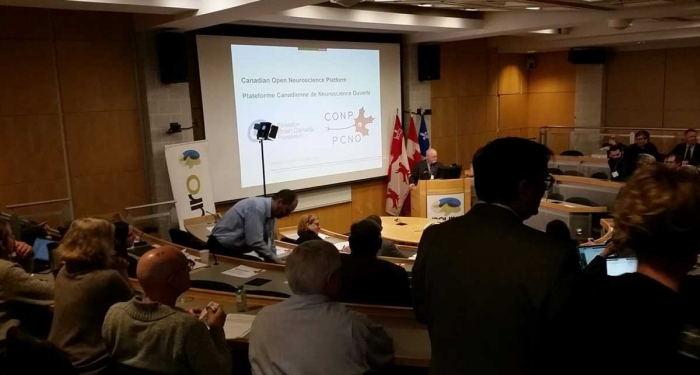The human brain is the most complex, compact system known in the universe and certainly one of the most mysterious. Researchers from McGill and the Montreal Neurological Institute and Hospital, now known as the Neuro, have long been at the forefront of neuroscience. This includes Wilder Penfield, who discovered brain areas that control our movements and sensations, and Brenda Milner, whose work with patient H.M. founded the field of neuropsychology.
On Feb. 19, McGill and the Neuro opened another chapter of neuroscientific progress by joining the Canadian Open Neuroscience Platform or CONP, an open access network for brain data. CONP is partnered with universities across Canada, including the University of Toronto and Queen’s University, and is internationally connected with Oxford University and Johns Hopkins University. CONP will connect researchers across Canada and the world to a single, gargantuan dataset, making up to 10,000 terabytes of brain data available to members of the partnership. To put this into perspective, one terabyte is equivalent to 1,000 gigabytes of data, enough to hold about 40 days worth of video. This informational treasure trove will help investigators create a more holistic understanding of the brain and provide important context for future experiments.
CONP is not restricted to just human brain data; it also includes animal models and cellular neuroscience data that can be used translationally to understand the underlying mechanisms of neuroscience.
Open science not only increases the validity of research, it also accelerates the pace at which research can be done. Parkinson’s, Alzheimer’s, and certain types of dementia can all be improved by treatments more rapidly developed thanks to CONP.
After joining the partnership, the Neuro promised to refrain from patenting any of their discoveries for five years in order to let others use the most recent innovations and data. This extraordinary move puts the focus away from profit, shifting it to ensuring that patients benefit, as well as researchers eager to harness the cutting edge of brain science and medicine.
Professor Maria Natasha Rajah, director of the Brain Imaging Center at Douglas Hospital Research Centre and associate professor of Psychiatry at McGill, told The McGill Tribune that this change will increase the efficiency of research and taxpayer dollars that go into funding grants.
“We invest up to $200,000 or more in data collection for a single experiment, and once we are finished publishing our papers it seems to be a waste of resources to just store the data in a backup system,” Rajah said. “CONP is a great opportunity for the research community to give back and give older data new life.”
The platform also solves one of the biggest problems in neuroscience research: Generalizability across populations that differ genetically and geographically. Rajah elaborated that CONP could facilitate the collection of data at an international level, helping combat more complex diseases.
“[Data that] crosses borders gives us access to a more representative sample of participants,” Rajah said. “Specific diseases, such as Alzheimer’s, […] may be influenced by individual differences in genetics, diet, education, and other lifestyle and environmental factors. […Many] of these questions relating to diversity in brain aging would benefit from larger, international, and diverse samples. CONP has the potential to help us tackle these bigger questions which are important because different treatments might be better for different samples.”
Joining CONP will foster an environment where researchers’ methodologies from across the globe can converge to create more replicable and compatible findings.
“A key thing that CONP brings is harmonization,” Rajah noted. “By having researchers from across Canada and the world collaborate, we can share and standardize our methods and make sure that once we’re finished collecting data, it can be integrated with the full dataset.”
The open science revolution is only beginning and McGill and the Neuro are joining in to reap the rewards it can bring.
“This is the future, this is where neuroscience and medical imaging is going,” Rajah said.








